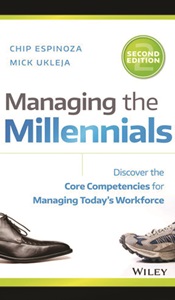Leading and Managing Millennials
Review of 'Managing the Millennials: Discover the Core Competencies for Managing Today’s Workforce' by Chip Espinoza and Mick Ukleja
 Millennials are the most researched generation in history, so the proliferation of books on every aspects of Millennials comes as no surprise. Standing above other works on the subject, Managing the Millennials: Discover the Core Competencies of Managing Today’s Work Force by Chip Espinoza and Mick Ukleja, addresses the phenomenon of Millennials, not from a purely sociological perspective, but from the perspective of how to lead them in the workplace. The book’s narrative is aided by an impressive depth of research conducted over two years and a breadth of real-world examples from both the successes and failures of business leaders.
Millennials are the most researched generation in history, so the proliferation of books on every aspects of Millennials comes as no surprise. Standing above other works on the subject, Managing the Millennials: Discover the Core Competencies of Managing Today’s Work Force by Chip Espinoza and Mick Ukleja, addresses the phenomenon of Millennials, not from a purely sociological perspective, but from the perspective of how to lead them in the workplace. The book’s narrative is aided by an impressive depth of research conducted over two years and a breadth of real-world examples from both the successes and failures of business leaders.
The authors identify nine points of tension that result from clashing values systems held by the Millenials and their mostly Baby Boomer managers, as well as nine managerial or leadership competencies required to mitigate each counterproductive disconnect. In doing so, the authors avoid the pitfall of others before them by not passing judgment on generational characteristics. Rather, they show how each characteristic of the Millennials can be positive and helpful, as well as how managers can effectively motivate the Millennials under their leadership.
While these managerial competencies comprise the meat of the book, the bigger value for the church may potentially be in recognizing the author’s overarching reason for writing the book. According to Espinoza and Ukleja, there is in the future of American companies coming an unprecedented leadership transition. At least 50 percent of executives in the U.S. are Baby Boomers eligible to retire. That will continue to be the case for the next 14 years. The problem is, if they retire, the people in the second, third and fourth positions of those companies are also Baby Boomers. “Long story short, an organization’s future vitality is dependent on its ability to attract, retain, motivate and develop Millennials."
Why should those in church leadership care? While this book is written from a purely business leadership perspective, the same basic statistic that is true for leadership in American businesses at large is true for churches as well. At the end of 2014 the average age of ordained Assemblies of God ministers was 59 and the median age is also 59. That means that half of all ordained AG ministers are over 59, with our oldest being over 100.
There is no doubt our pulpits are graying.
Everything, even ministry, has a life cycle. No one does it forever. And it is the tendency of every generation to ask whether those in the next generation are up to the challenge of leadership, whether they will be faithful ministers and whether they will be faithful to the core doctrines of the church
Learning about and increasing your ability to lead Millennials must be a priority for church leaders.
These are legitimate questions to ask, and we should take them seriously. But as my friend, Earl Creps, said in his book Off-Road Disciplines, we have no choice of whether to pass the baton to the next generation. There’s no one else coming.
Church leaders should be concerned about best practices in managing the Millennial generation if for no other reason than they have a responsibility to be good stewards of all the resources entrusted to them, including human resources. But that concern should extend beyond the need to motivate Millennials under their leadership to get the necessary work done. At the core of their concern should be the impending handoff of the leadership baton from themselves to someone in the younger generation.
If the baton handoff is to happen cleanly and effectively, Baby Boomers must have a relationship of trust with the Millennials under their leadership, trust gained through the use of managerial techniques and core competencies like the ones clearly laid out in this book.
Learning about and increasing your ability to lead Millennials must be a priority for church leaders. The largest leadership transition in history is coming to a church near you soon. How you prepare for, execute and steward that transition from one generation to the next will ultimately determine your success and faithfulness to Christ’s church, present and future.
Book reviewed: Chip Espinoza and Mick Ukleja, Managing the Millennials Discover the Core Competencies for Managing Today’s Workforce (Hoboken, NJ: Wiley, 2016).
Influence Magazine & The Healthy Church Network
© 2025 Assemblies of God

